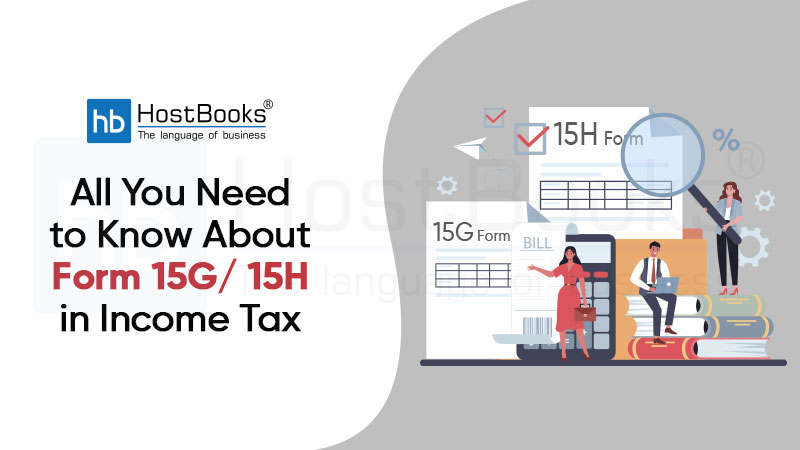Form 15G and Form 15H to Avoid TDS on Income Tax

Tax time is not good for many, especially when it is a large sum one has to pay. At that moment, one thing that pops up in one’s mind is the ways of saving on tax. Though there are various ways of saving on tax, bank FDs is one of the tax-saving instruments you can file a declaration in form 15G/15H to the deductor for non-deduction of tax on interest. Basically, that means if you don’t come under the income tax slab, the bank will not deduct TDS on interest on FDs.
What is Form 15G and 15H?
Form 15G and Form 15H are a type of self-declaration form that declares that your income is below than basic exemption limit thereby TDS should not be deducted from the interest income of FDs. So, if your total income is less than the basic exemption limit, you can request the bank not to deduct TDS on the interest of your fixed deposit using forms 15G/15H.
Who can Submit Form 15G & H?
Only resident individual taxpayers or HUF (Hindu Undivided Family) are allowed to submit Form 15G. Resident Individuals with an age of 60 years or more i.e. Senior Citizens are allowed to submit Form 15H. Companies, firms, the non-resident persons are not allowed to use these forms. To fill both the forms, individuals must have a Permanent Account Number (PAN).
Eligibility Criteria to Fill the Form 15G and 15H
Form 15G Eligibility
- Resident Individual or HUF
- Only individual who is less than 60 year
- The tax amount computed in an FY is nil
- The total interest income from fixed deposit in an FY is less than the basic exemption limit
Form 15H Eligibility
- Only Indian resident who is 60 year or above can fill.
- The tax computed on total income in an FY is nil
- The total interest income from a fixed deposit in an FY is less than the basic exemption limit.
Where can Form 15G and 15H be used?
Form 15G and Form 15H can be used to avoid TDS deductions. Some of the popular uses of these forms are as follows –
- More Than 40 Thousand Interest on Bank Deposits: If your interest income exceeds 40 thousand in an FY on your bank or post office deposit, there is a rule to deduct 10 percent TDS on it. For senior citizens, TDS is deducted if interest income exceeds Rs50,000. In both cases, if your total income in an FY is less than the basic exemption limit, you can submit Form 15G and Form 15H to prevent the bank from deducting TDS on your FDs’ interest amount.
- Withdrawal of EPF amount before 5 years: If you withdraw your EPF amount before the completion of 5 years of your work and the EPF amount exceeds 50000 rupees, then there is a rule to deduct TDS on it. Here too, you can submit Form 15G to prevent the bank from deducting TDS on it. Note that, to request the bank not to deduct TDS, your total annual income should not exceed Rs. 2.5 lakh including EPF amount.
- If the rent earned is more than 2.4 lakh rupees: If you are earning more than 2.40 lakh rupees annually from rent, then there is a rule to deduct TDS on it. Using form 15G or 15H you can avoid TDS deduction if your total annual income is less than the exemption limit.
- If payment received for a life insurance policy is more than 1 lakh: If you receive a payment for a life insurance policy that exceeds Rs 1 lakh, then there is a provision to deduct TDS on it. However, this TDS will be deducted only if the annual premium is more than ten percent of the insurance cover. In this case, Form 15G or Form 15H can be submitted to avoid TDS deductions.
- Bank Websites: Form 15G and Form 15H can easily be downloaded from the bank website. On the website of major banks, the PDF copy of Form 15G and Form 15H are available. You can download it from there or take out a print of it.
- On the Income Tax Department website: Both forms 15G and Form15H along with all the necessary forms related to income tax can be downloaded from the website of the Income Tax Department. You can visit the official income tax website to download the forms there.
- By Visiting Nearest Branch of Bank: If there is a problem in downloading the forms online, you can get those at the nearest branch of your bank or post office. Ask for Form 15G or Form 15H as per your requirement there and give the required details, the bank staff will provide the form to you.
What details are given in form 15G?
Form 15G is mainly divided into two parts;
Form 15G (part 1)
In this part, you have to give the details of your annual income along with the name, address, phone number, email, etc. Section of Income Tax Act under which there is the rule of tax deduction and the total amount to be deducted should also be mentioned in this part. After this, it has to be declared that all the details given in the form are correct. Declaring that, you have to sign on the form mentioning the date and place below.
Form 15G (part 2)
In this part, the name of the person responsible for paying, date of payment, and payment on behalf of the payment issuer (company, institution, or individual), address, PAN number, TAN number, phone number, email ID, etc. are given. At the bottom, you have to sign mentioning the date and place.


How to download form 15G & Form 15H?
Online Filling and Submission of Form 15G and 15H
Most banks are now offering the facility to fill in Form 15G and 15H online. For this, you must have the saving account in the same bank and your internet banking facility activated in it.
You can fill Form 15G or Form 15H through your net banking. Once you log in to your account, you have to click on the online fixed deposits tab there. On this page, you will find a link to generate Form 15G and Form 15H. Click on it, the form will open. The details given therein are to be filled in and sent to your bank.
Form 15(G), (H) Submission Rule Separately
Form 15G/15H has to be submitted separately every year to avoid TDS deductions on the interest amount of deposits. At the start of every new financial year, a new Form 15G and Form 15H have to be submitted.
Wrong declaration penalty for form 15G and form 15H
While filling Form 15G or Form 15H, you should fill in all the income and tax-related information correctly. In case of the wrong declaration of your income, legal action or penalties can be imposed against you. Under section 277 of the income tax act, you can be fined or imprisoned for 3 months to 3 years if you intentionally show your income less to avoid TDS deduction. In case of tax evasion of more than 1 lakh rupees, there can be imprisonment from 6 months to 7 years.
What if you forget to submit Form 15G or Form 15H?
In case of lack of attention, you may miss filling the Form 15G or 15H on time and TDS has been deducted on the payment you receive. In such a situation, you can do the followings –
Submit Form 15G/Form 15H as soon as possible
In a financial year, if you think that there is a possibility of cutting TDS from your income as per the rules, immediately submit Form 15G or Form 15H. This way, you can avoid TDS deduction on the remaining quarters. Note that, most banks deduct TDS every quarter. So, even if the TDS of the first quarter has been deducted, it won’t be deducted in the subsequent quarters.
Claim for TDS refund while filing ITR under form 15(G), (h)
If you have paid more tax than your income tax liabilities in an FY, then file ITR to claim the refund. Note that, the financial year ends on 31 March, and the assessment year start from that. In an assessment year, income tax returns can be filed from 1 April to 31 July. If you file returns after that, the penalty may be levied by the income tax department.

Try HostBooks
SuperApp Today
Create a free account to get access and start
creating something amazing right now!
















